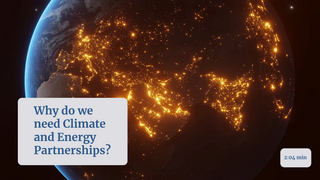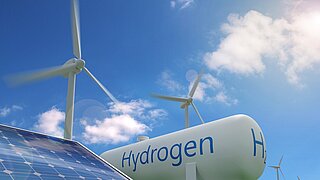About
Climate change is fundamentally affecting the world. It is threatening our environment, resources and livelihoods. Global warming requires rapid and ambitious action to achieve the Paris climate goals and drastically reduce greenhouse gas emissions.
To achieve the international climate goals and make climate neutrality a reality by 2045, the German government's international climate and energy partnerships have become one of the most important instruments of Germany's climate foreign policy. Their growing network strengthens the political dialogue on climate protection and energy system transformation between Germany and more than 30 partner countries worldwide.

The long-standing trust and effective working structures built by the bilateral partnerships not only help to strengthen climate cooperation and make progress on meeting global climate targets but also contribute to overcoming the challenges faced by Germany and its partner countries. The climate and energy partnerships act as an opportunity platform by promoting political dialogue, enabling partners to share perspectives and jointly addressing opportunities and challenges in the context of the global energy transition.
Climate and energy partnerships include different forms of cooperation
With regard to cooperating in the field of energy policy, achieving international climate goals and making climate neutrality a reality by 2045, the German Government’s international climate and energy partnerships (CEPs) have become one of its most important international energy and climate policy instruments. The growing network strengthens political dialogue on climate protection and energy system transformation between Germany and partner countries worldwide. The declared aim of this cooperation is to shape a successful global energy transition that combines security of supply, decarbonisation of industry and foreign trade promotion with effective climate protection. The opportunities, challenges and strategies are discussed via many channels and platforms, for example, regular steering group meetings, workshops, bilateral talks, delegation trips and virtual formats. All forms of cooperation are formally agreed in a joint declaration of intent (JDoI).
Climate and Energy Partnerships
CEPs are institutionalised cooperation arrangements based on a JDoI between Germany and one of its partner countries. Most CEPs are supported by a secretariat, a dedicated team based in the partner country that facilitates the implementation of the partnership.
To set the strategic direction of the partnership, a high-level steering committee meets once a year. Parallel to this, technical working groups and task forces ensure a continuous and trusting dialogue between the partners from the beginning of the partnership. They are usually chaired by department heads and serve as a platform for discussing and implementing concrete measures. With an annual Energy Day in the partner country and high-level participation in important conferences, particularly the Berlin Energy Transition Dialogue (BETD), these working groups foster exchanges between the stakeholders.
In addition, regular forums are organised for exchanges with the private sector, including local business councils and dialogues with relevant stakeholders, such as German Embassies and German Chambers of Commerce Abroad (AHK). These activities strengthen cooperation between the public and private sector and contribute to the successful implementation of CEPs.
Energy Dialogues
Countries that aim to promote private sector activities and seek to strengthen cooperation between the public and private sector are most likely to engage in cooperation in the form of an energy dialogue.
An energy dialogue is the preliminary stage of a CEP. As in a partnership, specific dialogue topics and a work plan are defined in an energy dialogue. A central feature is the organisation of an Energy Day, which promotes exchanges on the agreed topics and strengthens cooperation between government and private sector stakeholders.
Hydrogen Partnerships
Germany is working with a growing number of countries to accelerate the expansion of green hydrogen. While hydrogen is also a core topic within the scope of existing CEPs, special hydrogen partnerships have been established with strategically important export and import countries to ramp up the development of green hydrogen.
Our Goals

Energy Security
The CEPs aim to enhance energy security by reducing dependence and increasing diversification. They foster international cooperation to build resilient supply chains and decarbonise energy systems and economies. This helps to secure future supplies of decarbonised energy carriers and strategic products. By driving the global adoption of renewable energy, hydrogen and energy efficiency technologies, the CEPs help to shape a more stable and sustainable energy future.
Decarbonisation
The CEPs contribute to global climate action by supporting the implementation of mitigation measures in the partner countries. Crucial to this is the expansion of renewable energy and energy efficiency. The CEPs offer policy advice, encourage dialogue between businesses and governments and promote industrial cooperation. By fostering trade in decarbonised energy resources and products between Germany and the partner countries, they are helping to achieve Germany’s goal of climate neutrality by 2045.


Foreign trade promotion
Private investment is crucial for transforming energy systems and decarbonising industries. The CEPs act as an intermediary between private sector actors and governments to reduce investment barriers and promote trade. This happens through bilateral exchange at the government level, aimed at supporting private investment in energy projects politically, among other things. In addition, concerns about investment obstacles faced by German and local companies are collected, for example through local business councils, and addressed at the political level.
